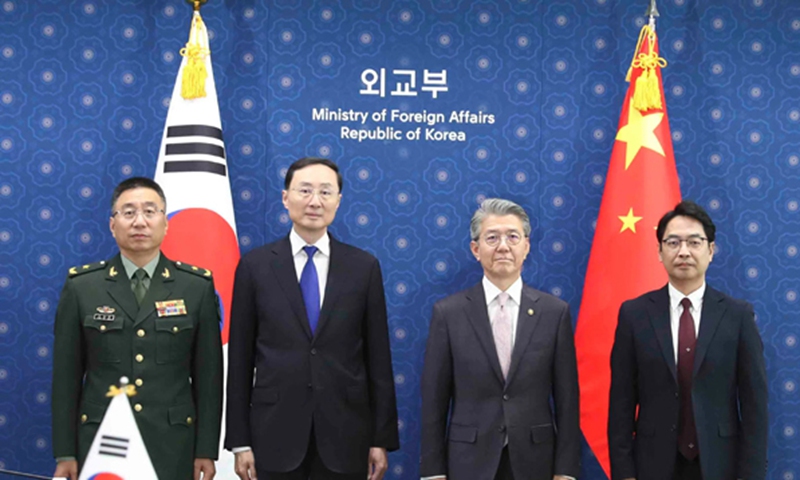
Vice Minister of Foreign Affairs Sun Weidong and Deputy Director of the Office for International Military Cooperation of the Central Military Commission Zhang Baoqun co-chaired the first China-South Korea 2+2 vice-ministerial level diplomatic and security dialogue with Vice Minister of Foreign Affairs Kim Hong Kyun and Director General of International Policy Bureau of the Ministry of National Defense Lee Seung-buhm of South Korea in Seoul. Photo: Chinese Foreign Ministry
China and South Korea have held their first vice-ministerial level diplomatic and security dialogue, or 2+2 dialogue, which offered the two countries a platform to communicate positions on key issues, maintain the momentum of stabilization of bilateral relations, analysts said on Wednesday.
Chinese Vice Minister of Foreign Affairs Sun Weidong and Deputy Director of the Office for International Military Cooperation of the Central Military Commission Zhang Baoqun co-hosted the 2+2 dialogue with South Korea's First Vice Foreign Minister Kim Hong-kyun and Director General for International Policy at the Defense Ministry Lee Seung-buhm.
The two sides communicated their diplomatic and security policies, and had candid and in-depth exchanges of views on bilateral relations and international and regional issues of mutual interest, the Chinese Foreign Ministry released on its website on Wednesday.
South Korea mentioned the engagement and cooperation between North Korea and Russia. The Chinese side noted that North Korea and Russia, as friendly and close neighbors, have the legitimate need for exchanges, cooperation and development of relations.
Holding the first vice-ministerial level diplomatic and security dialogue between China and the ROK was agreed quite early on by the two sides in light of the need of growing bilateral relations and has no particular link to the engagement between other countries, said Chinese Foreign Ministry spokesperson Lin Jian.
The China-South Korea 2+2 dialogue dates back to 2002 when it was a director-general level mechanism. Da Zhigang, director of the Institute of Northeast Asian Studies at the Heilongjiang Provincial Academy of Social Sciences, told the Global Times that the upgrading of the mechanism meets the demand of bilateral relations and can serve as a stabilizer and mediator of regional tension and conflict.
It is primarily a bilateral framework that allows China and South Korea, who have close trade and culture ties, to enhance communication and trust on diplomacy and security issues, Da said.
According to the Chinese Foreign Ministry, both China and South Korea reiterated during the 2+2 dialogue their commitment to valuing and developing friendly and mutually beneficial relations, agreeing to actively engage in dialogue and exchanges at all levels and in all fields.
They agreed to strengthen communication through mechanisms such as high-level strategic dialogues, diplomatic security 2+2 dialogues, and 1.5 track dialogues to enhance political mutual trust and advance the healthy and stable development of the China-South Korea strategic cooperative partnership. Both sides agreed to enhance local and youth exchanges, continuously improving the friendly feelings between the two peoples.
China expressed a firm stance on issues involving its core interests and major concerns such as on the Taiwan question, demanding that South Korea handle them in a responsible manner. South Korea reiterated that its position of respecting the one-China principle has not changed.
Both China and South Korea are beneficiaries of economic globalization. They should work together to maintain the stability of the global production and supply chains, resist the politicization and securitization of economic issues, and oppose all forms of trade protectionism and "building walls and barriers," Chinese officials said.
Both sides expressed their positions and views on the Korean Peninsula issue. China emphasized that maintaining peace and stability on the peninsula is in the common interests of all parties, including China and South Korea. The context and crux of the situation on the peninsula are clear, and the urgent task is to cool down the situation, avoid escalating confrontation, and adhere to the overall direction of a political solution. China has always determined its position based on the merits of the matter itself and will continue to play a constructive role in Korean Peninsula affairs in its own way.
Da said although there are differences between China and South Korea on various topics, such a dialogue is important in communicating stances to avoid misjudgment and maximize common ground.
It is unrealistic to expect one round of dialogue to solve thorny issues between the two countries, but it is a very positive start that could lead to more constructive talks and cooperation, Da added.




